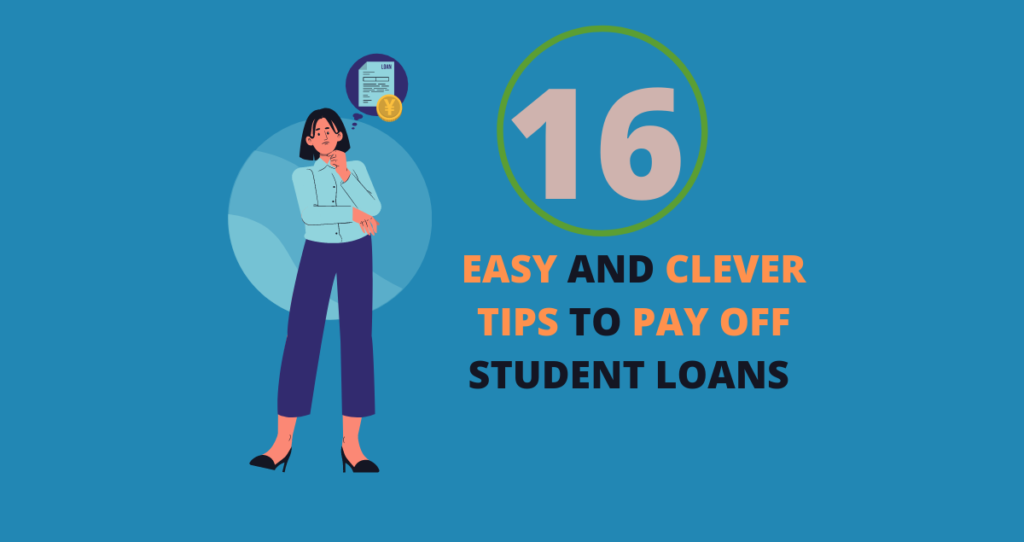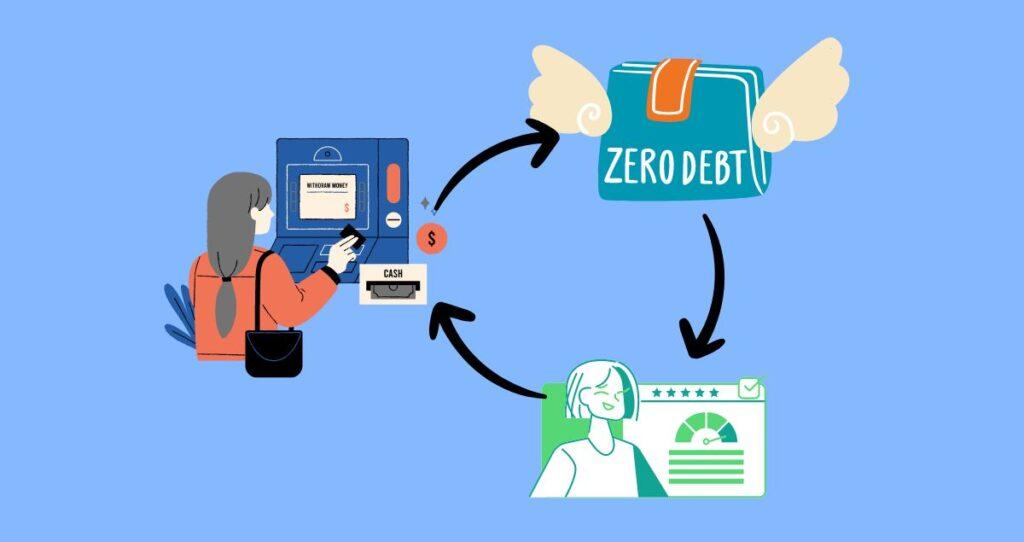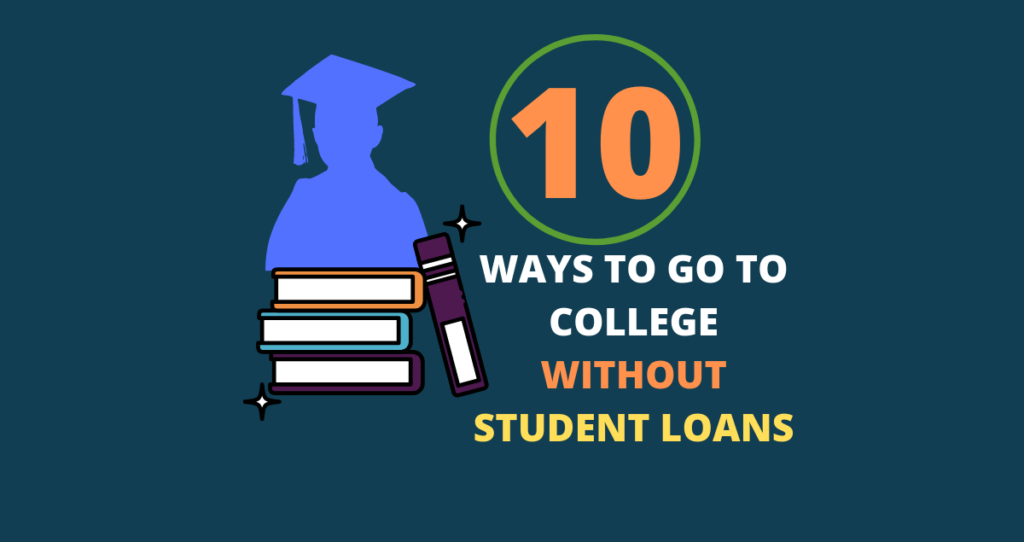How to pay off student loans fast? Are you struggling with your student loans? If so, you have come to the right place.
Student loans are big traps for millions of graduates. They [student loans] will guarantee you a degree (if you study hard) but they will never guarantee you a job.
This is why millions of students are not able to pay off student loans after their graduation. Around 10.83% of students with loans can’t keep up with their payments.
So, how can you make sure that you will not fail to pay off your student loans?
In this article, you are going to learn 16 tips you can use to pay off your student loans faster.
1. How to pay off student loans: Refinance your student loans
If your student loans have higher interest rates, you can refinance them. Refinancing a loan means that you trade your old loan with another one that has a lower interest rate.
The new loan with a much lower interest rate will allow you to save money on the interest charges which will help you pay off your loan faster.
You should know that if you refinance a federal student loan with a private loan, you could lose some federal loan benefits such as student loan forgiveness.
Related: Mortgage refinance: How to refinance a mortgage?
2. Do not use repayment programs
Your student loans will be some of the greatest burdens you will ever have. For this reason, you could be tempted to take an easy route to pay it off.
One way some people think can help them to pay their student loans is to use the repayment program.
These programs will promise you miracles that will never come true. Some student loans repayment programs may reduce the amount you pay per month which could seem like a great deal.
However, paying less money every month will stretch the length of your loan.
The longer you keep the loan, the more money you will pay in interest.
As a result, you will end up paying more money on the loan than you could have paid if you did not use these programs.
If you really want to pay off the loan faster, avoid repayment programs and use other methods.
3. How to pay off student loans: Pay off capitalized interest charges right away

When you get student loans, the principal amount will be the total amount you borrowed. The interest charges will be the interest you will pay on the loan expressed as a percentage of the principal amount.
The interest can vary or be fixed over the lifetime of the loan. Some student loans especially private ones have interests that accrue even before your graduation.
This means that you will start paying interest on the loan after getting the loan and this interest will be added to your principal. As a result, the total amount of the student loan you owe the lender will increase even if you did not borrow more money.
This is the power of compounding interest and it will benefit the lender, in this case. That is you will start paying interest on both the principal and accrued interest.
How can you fix this problem?
To prevent the loan from increasing, you must pay all accrued interest before it is added to the principal amount. The interest may not be too much depending on how much you borrowed and the interest rate you pay on the loan.
So, taking care of the interest will keep the principal amount constant. As a result, you will pay less money on student loans.
4. Pay more than the minimum required amount
Your loan value could be constant if there was no interest applied to it. Unfortunately, this is not the case. The interest charges will increase the loan value to a level where you can no longer afford to pay it off.
In addition, the time it will take you to pay off the loan and how much you will end up paying will depend on how much you pay each time. The more money you pay the quicker you pay off the loan. Thus, paying less money on the loan.
This is why you should always pay more than the minimum requirement.
5. How to pay off student loans: Set up an auto-pay

One of the most powerful ways to pay off any kind of loan is to set up an automatic payment.
You can link your bank account to the account you have with your lender. This way, a fixed amount you decided ahead of time will be transferred to your lender at a date and frequency you specified.
In addition, a percentage of your paycheck can be used to pay off the loan directly from your company. You will need to work with your employer and lenders to set it up.
Having an automatic payment may sound simple. However, it is a powerful technique that ensures that you always pay your dues on time. This will also prevent you from allocating loan payment amounts toward other expenses.
NOTE: Make sure that you have enough funds in your account all the time. Without enough money in your bank account, you could end up with an overdraft in your bank account and late payments on your student loans. As a result, you will pay penalties and related charges to both entities.
6. How to pay off student loans: Get a second job
If you think you are not making enough money to cover your student loans payments; get a second job. A second job will help you increase the amount you pay every month.
You can either get a part-time job or a full-time job depending on your schedule and the time you have at your disposal. If your schedule does not allow you to have another job, consider starting your own side hustle. You can sell things you don’t need, start an online business, etc.
>>LEARN MORE: 20 Ways To Make Money From Home
7. Increase your salary at work

Increasing how much you make at your current job can give you more money for your student loans payments. There are many ways you can get paid more.
- Work hard for a raise
- Get a promotion
- Target bonuses
Any of these options will increase the money coming into your pocket. You can also try all these three options to get the most out of your job.
For example, you can get a promotion that will result in more salary and bonuses.
>> MORE: How To Get A Raise Or A Promotion At Work?
8. Create a budget and stick to it
Creating a budget is an important step in paying off your student loans. The budget will help you analyze your income, expenses, and current financial situation.
In addition, the budget will help you decide much you can safely allocate toward your student loans payments.
Should you want to make adjustments on how much you pay? You can easily make changes using your budget and track your progress.
Related: How to make a budget: Step-by-Step
9. How to pay off student loans: Learn how to save money
You cannot pay off your debt with the money you do not have. This is why saving money is a crucial step in paying off your student loans.
Save as much money as you can. The more money you save, the more you will have for your loan payment.
There are many ways and techniques you can use to save money.
The rule of thumb: Do not spend money when you don’t have to and spend less when you have to.
The following articles can help you save a lot of money.
- How To Save Money: Step By Step
- 45 Ways To Save Money On Groceries
- 16 Tips You Can Use To Save Money In College
- How To Save Money On Car Insurance? 20 Tips
- 16 Ways To Save Money On Utility Bills
- Financial Independence: 18 Tips To End Your Struggle With Money
10. How to pay off student loans: Reduce your expenses
Reducing your expenses goes together with saving money. You will save more money only if you reduce your expenses.
So, learn how to reduce your expenses. Are you buying things you don’t need or buying the most expensive stuff?
If so, you are spending more than you are supposed to.
Buy where things are cheap. For example, you can shop at Dollar Tree and Thrift Stores for things you need. This is how you will spend less money.
You can also reduce your expenses on entertainment and online subscriptions. Do you pay for Netflix, Hulu, Disney, Amazon Prime, etc. at the same time? You can reduce your streaming expenses by canceling most of these services.
11. Use tax deduction and credits

The student loans interest deduction allows you to subtract a certain amount of interest you paid from your taxable income.
This trick can help you pay off your student loans faster through savings on interest.
More reading: How to lower property tax? Save money in tax
12. How to pay off student loans: Live within your means
Paying off your student loans will require you to use money wisely. You will need to manage every penny you make and avoid spending money when it is not necessary.
You must learn how to survive on fewer things and avoid spending on useless things especially those you don’t need.
Related: 18 habits of frugal people: How do frugal people live?
13. Pay off the student loans before getting other loans
It will take you a lot of years to pay off your student loans. The amount you pay for every payment period, the interest rate on the loan, and the total amount you borrowed will determine how long it takes you to pay off the loan.
You must focus on paying off your student loans before getting more loans. For example, you may want to buy a house or a car with a mortgage or a loan.
These loans will increase the amount you owe creditors and the interest you pay. As a result, you will be in a much deeper financial hole than you were with just student loans.
Before applying for more loans, consider paying off your student loans. This method will keep you in less stressful financial situations and give you a chance to do more of the things you love.
Related: How to get approved for a mortgage?
14. Get a help from family members and friends
You are not alone in your debt management journey. Your friends and family members could help you if they have the means to do so.
For example, if you are struggling with high-interest charges, they can lend you money that you can use to reduce your balance. You can pay them later after getting back on your feet.
15. How to pay off student loans: Work for the government

Your remaining tuition can be forgiven if you work for the government through the public service loan forgiveness program. You must have worked in public service for at least 10 years for the government to forgive the remaining balance on the eligible student loans you have.
Additional conditions apply for qualification requirements. You must have made 120 monthly payments and be a full-time employee of a public service entity such as:
- Peace Corps
- AmeriCorps
- Government offices such as Federal, state, or local government office
- Private entities that provide public services
- Etc
To learn more in details, follow this link: gogovernment.org
Related: 11 easy ways to reduce credit card debt
16. Use the grace period to your advantage
You do not need to wait for the grace period to end to start making payments. The grace period is a time between your graduation date and when you are required to start making payments on your student loans. This period varies from one lender to another and loan types. However, it can be six months or more.
You can take advantage of this period and pay off as much as you can. Doing so will reduce the amount you owe your debtor.
A lower balance will result in lower interest charges and a small monthly payment.
This will help you pay off the loan much faster and easier.
In addition, you will end up paying less money overall compared to how much you could pay if you were paying interest on the full amount.
Student loans with six months grace period
By default, you do not start paying off your loan while you are still in school (this varies depending on whether you have a private loan or a federal loan).
You also get a six grace period (vary based on the type of loans) after your graduation.
This period is designed to help you find a job and settle down before you start paying off the loan principal and its interest.
NOTE: Keep in mind that private student loans usually start charging you interest right after getting the loan.
The following are student loans with six month grace period according to debt.org.
- Some Private Students Loans
- Subsidized Federal Stafford Loans
- Unsubsidized Federal Stafford Loans
- Direct Subsidized Loans
- Direct Unsubsidized Loans
Types of student loans
The following are types of loans both federal and private loans.
Types of Private Student Loans
- Private Parent Loans
- Private Student Loans
Types of Federal Student loans
- Graduate PLUS Loans
- Direct Subsidized Loans
- Parent PLUS Loans
- Direct Consolidation Loans
- Direct Unsubsidized Loans
When should you get student loans?

The student loans will be good for you only if they can help you graduate faster with a job waiting for you.
For this reason, they (student loans) should be the last option to consider. That is you have to apply for scholarships, jobs on campus, grants, work-studies, etc. before you get student loans.
Do not wake up in the morning and get student loans thinking that they are free money.
Student loans are like any other loan and will make your life miserable if you do not treat them seriously.
That is you should avoid student loans at all costs.
Are student loans good?
Student loans can be good or bad depending on how you use them and how much you use them.
In my point of view, I would recommend getting a student loan only if it is the last option. Furthermore, you have to be going for something that will give you enough income to help you pay off the student loan after your graduation.
Consider the following example.
A student who studied Geography graduated with over $200,000 in student loans. After graduation, he realized that there are no jobs for Geography majors in the area.
Since he cannot relocate to another area, he decided to apply for other jobs that are outside of his major. As a result, he ended up earning a fraction of what the salary could have been if he was using his degree.
since our imaginary person is not making enough money and has hundreds of thousands in student debt, he will never get out of this debt. In my own opinion, the student used the student loan for the wrong degree.
This is a major issue in modern education. Many people are doing jobs that they never went to school for.
As a result, companies are taking advantage of them.
Without making enough money, many graduates are struggling to pay off their student loans.
That is why before you get a student loan:
- Make sure that you are going for something that will pay you well after graduation
- Consider other alternatives before getting a student loan such as grants, scholarships, internships, etc.
- Do not apply for a loan from your freshman year. Wait and apply for it only when you need it. You can also consider being a part-time student.
- Apply for less amount and hustle for the remaining amount
- Work while in school
Benefits of student loans
- Student loans can help you build your credit: Moneylenders will consider you a credible borrower if you had a student loan and paid it off successfully. This is one of many ways you can build credit without a credit card. This loan can also help you build your credit score since your payment history, for example, will be reported to the credit reporting companies (Equifax, TransUnion, Experian).
>>LEARN MORE: What Is A Credit Score And How Does It Work?
>>LEARN MORE: How To Build Credit Without A Credit Card?
- You get interest rate deduction: Your student loan interest is tax deductible. You can deduct up to $2,500 of the interest you paid on the loan for higher education. This is one of the greatest benefits of student loans.
- A chance to finish your education: Student loans are not terrible depending on how you use them. They will help you finish your school faster and with ease. The degree that seamed impossible will be at your fingertips.
- Flexible payment structures: Student loans have flexible payment options compared to other loans. For example, some student loans will not require you to pay them off while you are still in school. In addition, you will most likely have a six month grace period before you start paying off the loan. It will be difficult to find another loan with this much flexibility.
Disadvantages of student loans
- You are accumulating debt at an early age: The sweet deal will soon come to an end and you will face the reality. Your student loan is like other loans. It will be difficult to pay off the loan if you do not have a good job to cover your payments. Falling behind on your payment will ruin your credit history and credit score. For this reason, you must stay away from student loans and explore other options.
- You will never be free until you pay off your student loan: You will kiss goodbye all the good stuff and lifestyle you could have without a student loan. For example, it will be hard for you to qualify for a house mortgage if you have an outstanding balance on your account. Besides, how will you be able to put together a down payment on the house, if you have an outstanding balance on your student loan?
- Penalties, fees, and other charges for missed payments: Like other loans, it is a nightmare to miss a payment on your student loan. Missing a payment will lead to penalties, fees, and other charges. Missed payments could also be reported to credit reporting companies. As a result, your credit history and credit score could be ruined for a very long time.
>> MORE: What Are The Factors On Which Credit Score Is Based On?
>> MORE: Credit Report Overview
What should I do if I can’t pay off my student loans?

It is possible that you will not be able to pay off your student loan. Well, this is not the end of the world. Like other loans, there are proper steps you should take when you cannot make your payments.
The last thing you can do is acting like there is nothing wrong.
What should you do if you cannot pay off your student loans?
- Work with your loan provider: The company or institution that gave you the loan does not want to see you fail. How will they make money if you fail? So, they will try every option possible to help you succeed. Of course, you should have the drive to succeed. Your moneylender could give you information about repayment programs, ease the terms (not guaranteed), take a portion of your paycheck, etc. Whatever they choose to do, you will be in good hands. You must communicate with your lender about your struggles before it is too late.
- Go through money-saving tips: If you are falling behind on your payments, it is probably that you are making less money or spending more than you are supposed to. Learning how to spend less money and saving more could help you increase the amount you pay every month. Thus, bringing you back on track fast.
- Increase your active income: Your active income is the money you make when you go to work. If your active income is small, you are probably not making enough to cover your payment requirements. To solve this problem, you can increase the money you make every month. You can make more money through raises, promotions, bonuses, or by creating your own side hustle. More active income can help you increase your monthly payments.
>> LEARN MORE: How To Get A Raise Or A Promotion At Work?
>> LEARN MORE: 20 Ways To Make Money From Home
- Consider student loans consolidation: Student loans consolidation could help you lower the interest on your loan interest and combine multiple student loans into a single loan. This could result in much better terms and payment requirements. Thus, paying off your debt faster.
- Student Loan Forbearance: Is it hard for your to pay off student loans? Maybe you just lost your job and cannot figure out your way around this setback? Well, you can apply for a student loan forbearance. This service can allow you to not make payment for a given period of time. Ask your money lender for terms and conditions. You may be required to continue paying the interest.
- Use student loan forgiveness and discharge programs: When your student loan is forgiven, it means that you will no longer have to pay all or some of your loan.
- Try student loan deferment: A loan deferment can be used as a temporary measure to help you get back on your feet. The deferment will let you reduce the amount you pay or stop paying up to 3 years.
More learning resources
- Why is it a bad idea to pay off the smallest debt first?
- Struggling with debt? This is why people struggle with debt
- Student Loans:10 ways to go to college without student loans
- How many credit cards should I have?
- What is a good APR for a credit card?
- Does income affect credit score? Income vs credit score









